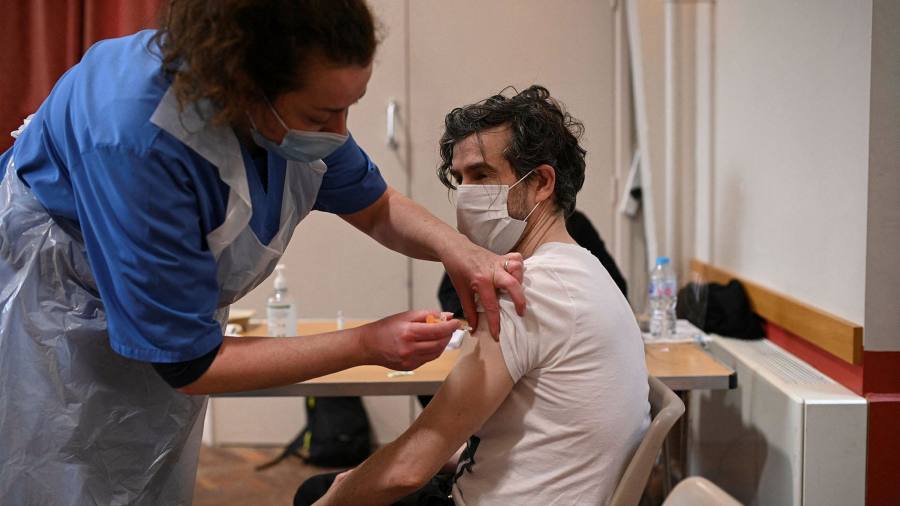[ad_1]
The UK government on Friday urged the public to continue to adhere to lockdown rules, after data showed that one in five local authorities in England had seen an increase in coronavirus infections in the past week.Â
UK-wide data indicate that the pandemic’s impact continues to lessen across the country, with new infections falling by 2 to 6 per cent per day, while the official estimate of R, the average number of people to whom someone infected passes the virus, is in the range 0.6 to 0.9 for the UK as a whole — the same as a week ago.
However, speaking at a Downing Street briefing, health secretary Matt Hancock warned that regional disparities remained in infection levels across England.
“The number of cases is now falling by only 15 per cent a week,†he said. “In some areas of the country, that has flattened entirely and one in five local authority areas has seen a rise in cases in the last week.â€
Jonathan Van-Tam, the UK’s deputy chief medical officer, echoed this sentiment and said that while the NHS was “moving at some speed†through the prioritisation groups with vaccinations, there was still “a long way to go†before the adult population was covered.Â
“In some parts of the UK case rates are changing — albeit slowly — but in the wrong direction. This is not a good sign and reinforces the fact that this battle at the moment is not won,†he said. “Do not wreck this now — it is too early to relax.â€
As of Friday morning, over 19m people in the UK had received at least one dose of a Covid-19 vaccine.Â
The NHS will continue to prioritise vaccinations based on age, rather than occupation or race, the Joint Committee on Vaccination and Immunisation (JCVI) announced on Friday.
The government said it remained on course to meet its target to offer a vaccine to everyone in the highest priority groups — including the over-50s, health and social care workers, and those with underlying health conditions — by mid-April. From then onwards, those between the ages of 40 and 49 will be prioritised, followed by the over-30s, then those aged over 18.Â
This follows advice from the JCVI, which concluded that targeting occupational groups would be more complex to deliver, potentially slowing the vaccine programme, leaving vulnerable people at higher risk for longer.
“We will follow this clinical advice and get jabs into arms as quickly as we can,†Hancock said. “I’m sure we all agree that the best approach is the one that saves the most lives.â€
Anthony Harnden, deputy chair of the JCVI, said one reason the vaccination programme was working so successfully was its simplicity. He added that data on exposure and risk based on occupation were “not robust†and “inconsistent†and therefore difficult to base decisions upon.
Harnden said data from the Office for National Statistics indicated teachers were no more at risk of severe disease than people in many other professions.
Unions expressed disappointment with the decision not to prioritise key workers such as teachers and police officers.Â
The Police Federation of England and Wales described the announcement as an “utter betrayalâ€.Â
National chair John Apter, accused the government of “hiding behind the science of the JCVIâ€, adding: “It’s right that the most vulnerable and health and care workers were vaccinated, but what about police officers who cannot mitigate against the risks of contracting and spreading this deadly virus?â€
Ahead of schools reopening in England from March 8, Geoff Barton, general secretary of the Association of School and College Leaders, said: “We are disappointed that the JCVI has not advised the prioritisation of education staff in the next phase of the Covid vaccine programme.
“The government needs to make a policy decision on this matter having insisted that education is a national priority and having announced a ‘big bang’ return to the classroom.â€
The current nationwide lockdown rules in England
-
The main restriction is a firm stay-at-home message
-
People are only allowed to leave their home to go to work if they cannot reasonably do so from home, to shop for essential food, medicines and other necessities and to exercise with their household or one other person — once a day and locally
-
The most clinically vulnerable have been asked to shield
-
All colleges and primary and secondary schools are closed until a review at half-term in mid-February. Vulnerable children and children of critical workers are still able to attend while nursery provision is available
-
University students have to study from home until at least mid-February
-
Hospitality and non-essential retail are closed. Takeaway services are available but not for the sale of alcohol
-
Entertainment venues and animal attractions such as zoos are closed. Playgrounds are open
-
Places of worship are open but one may attend only with one’s household
-
Indoor and outdoor sports facilities, including courts, gyms, golf courses, swimming pools and riding arenas, are closed. Elite sport, including the English Premier League, continues
-
Overseas travel is allowed for “essential†business onlyÂ
Full details are available on the government’s official website.
[ad_2]
Source link





